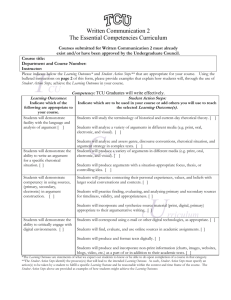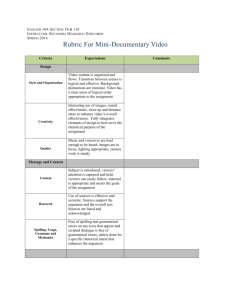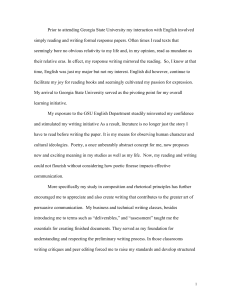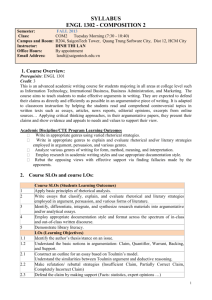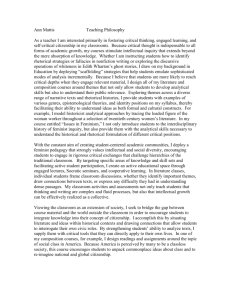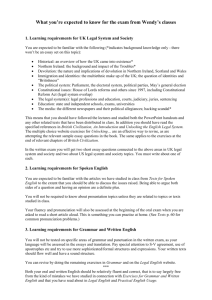AP Language and Composition Syllabus 2013
advertisement
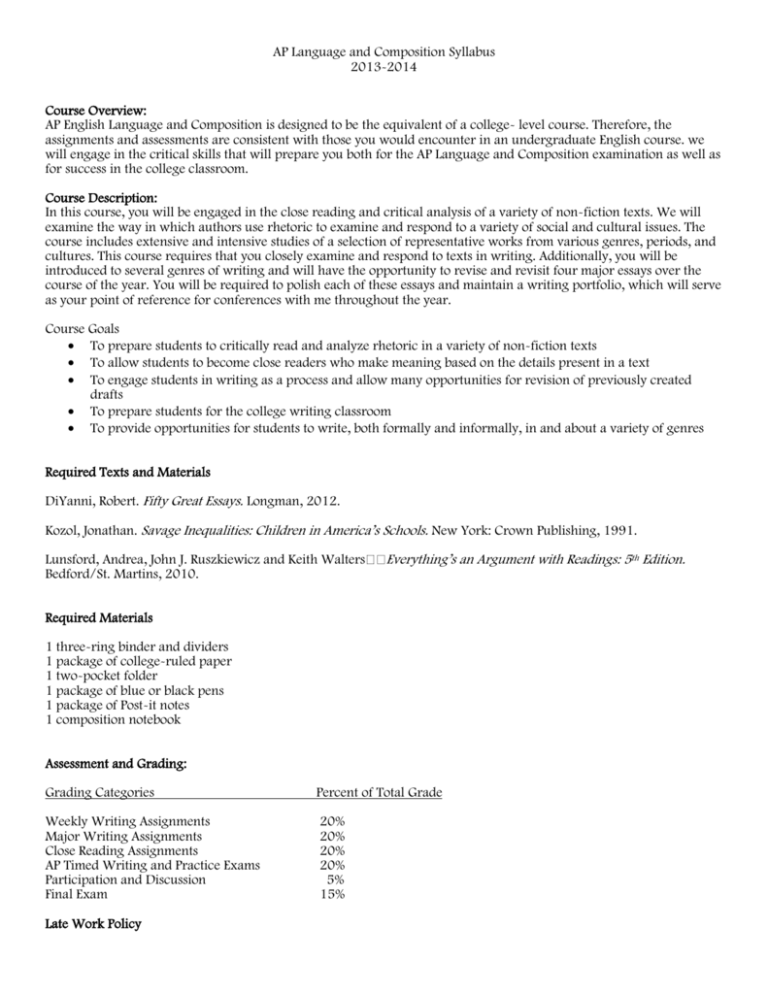
AP Language and Composition Syllabus 2013-2014 Course Overview: AP English Language and Composition is designed to be the equivalent of a college- level course. Therefore, the assignments and assessments are consistent with those you would encounter in an undergraduate English course. we will engage in the critical skills that will prepare you both for the AP Language and Composition examination as well as for success in the college classroom. Course Description: In this course, you will be engaged in the close reading and critical analysis of a variety of non-fiction texts. We will examine the way in which authors use rhetoric to examine and respond to a variety of social and cultural issues. The course includes extensive and intensive studies of a selection of representative works from various genres, periods, and cultures. This course requires that you closely examine and respond to texts in writing. Additionally, you will be introduced to several genres of writing and will have the opportunity to revise and revisit four major essays over the course of the year. You will be required to polish each of these essays and maintain a writing portfolio, which will serve as your point of reference for conferences with me throughout the year. Course Goals To prepare students to critically read and analyze rhetoric in a variety of non-fiction texts To allow students to become close readers who make meaning based on the details present in a text To engage students in writing as a process and allow many opportunities for revision of previously created drafts To prepare students for the college writing classroom To provide opportunities for students to write, both formally and informally, in and about a variety of genres Required Texts and Materials DiYanni, Robert. Fifty Great Essays. Longman, 2012. Kozol, Jonathan. Savage Inequalities: Children in America’s Schools. New York: Crown Publishing, 1991. Lunsford, Andrea, John J. Ruszkiewicz and Keith Walters Bedford/St. Martins, 2010. Everything’s an Argument with Readings: 5th Edition. Required Materials 1 three-ring binder and dividers 1 package of college-ruled paper 1 two-pocket folder 1 package of blue or black pens 1 package of Post-it notes 1 composition notebook Assessment and Grading: Grading Categories Percent of Total Grade Weekly Writing Assignments Major Writing Assignments Close Reading Assignments AP Timed Writing and Practice Exams Participation and Discussion Final Exam 20% 20% 20% 20% 5% 15% Late Work Policy In the event that you do not complete a homework assignment, you must sign in for afterschool tutoring on the board at the front of the classroom. You will be required to stay after school to complete the work, as noted in your introduction to AP meetings last year. Late work will be accepted for 50% credit up to 5 school days after the work is due. Journals/Freewrites Twice a week, you will be presented with quotations from essayists that are meant to prompt thinking and help you react to ideas about writing and their world. These journal entries will be assessed for completion and counted under the weekly writing assignment category. Saying/Doing/Purpose Journal This critical reading journal will accompany all of your readings this semester. Throughout the course of the year, you will use this journal to explore the following: Author’s Claims (including how these claims evolve over the course of the text) Use of Evidence and Detail Appeals: Logos, Ethos, and/or Pathos Rhetorical Strategies Organizational Patterns Elements of Style You will use these journals to drive class work and discussions as well as to craft essays and to inform your discussions in one-on-one conferences with me three times throughout the year. Major Writing Assignments For each major writing assignment, you will be required to engage fully in the writing process. You must submit a draft to your audience for feedback, and they will provide you with specific and accurate feedback per the Writer’s Circle protocol to drive your revision. This process will be repeated for each writing assignment. Your grade will be determined on the progress you make through this drafting process. In this class, you will not be graded against your peers but against yourself. Therefore, the writing process is a way for me to assess your progress in the course. In-class Timed Writings In order to prepare you for the AP Language and Composition exam, we will perform in-class timed writings throughout the course of the year. While several timed writings are included in this syllabus, there will be shorter timed writings on a bi-weekly basis. This practice ensures that you are ready for the timed writing required by the AP exam. Feedback Growing as a writer requires the careful consideration and incorporation into your piece. Feedback in this course will take the following forms: Whole- class mini-lessons that address areas for growth Individual feedback from the instructor, both in written and verbal form during one-on-one confereces Feedback from your triad (a group of two other people who consider your piece and provide feedback on an ongoing basis) Writer’s Circle evaluation of your piece (to be done with every major writing assignment) Self-assessment based on goals and standards Feedback will be specific and targeted toward our current focus. Earning an A, B, or C in this course will require that you actively incorporate feedback to improve your draft, both for weekly writing assignments and for major compositions. Final Exam Your final exam grade will be a portion of the AP Language and Composition exam. This will give you the opportunity to assess your progress at the end of semester one. You will be required to reflect on your progress both on the multiple choice and writing portions of the exam. Pre-Course Assignment Attend Summer Workshop, June 18-20 Read Savage Inequalities: Children in America’s Schools Complete a Saying/Doing Journal that evidences comprehension and addresses use of and purpose for rhetorical strategies Participate in weekly Edmodo discussions in response to posted close-reading question Course Planner Unit One: Education: Beginnings to the Current Status of Education in America (10 weeks) Texts Savage Inequalities: Children in America’s Schools by Jonathan Kozol Excerpts from Democracy and Education by John Dewey Excerpts from Pedagogy of the Oppressed by Paulo Freire Excerpts from Report of the Massachusetts Board of Education “I Know Why the Caged Bird Cannot Read” by Francine Prose “Superman and Me” by Sherman Alexie “ I Just Wanna Be Average” by Mike Rose “Stop the Madness” by Diane Ravitch Selected visual texts Student-selected newspaper articles Tasks Grammar and Vocabulary/Lit Terms Exercises: Daily grammar and vocabulary exercises will help students build sentence composing skills and AP-level vocabulary. Bi-weekly Timed Writing Practice: Students will receive practice with writing prompts. Feedback will be based on the AP rubric. Saying/Doing/Purpose Journal: Focus: For each reading, students will identify appeals and rhetorical strategies in the essays provided. Students will craft a double-sided journal that positions comprehension of the passage on the left-hand side of the paper and an explanation/analysis of the type and purpose of rhetorical strategy on the right-hand side of the paper. Students will compose a rhetorical précis for each piece of work that analyzes the purpose and effectiveness of a rhetorical strategy used in the text. Students will, using the Writer’s Circle protocol, revise this rhetorical précis. Analysis of Visual Images: Students will analyze visual images, including advertisements, for use of appeals (ethos, logos, and pathos). Students will write responses to these visual images, noting how the appeals work to persuade or convince the reader. Students will analyze the rhetorical strategies that help to build ethos, logos, and pathos. Rhetorical Analysis of selected piece Major Composition Unit Two: Gender and Identity: Synthesizing Notions of Gender and Power (6 weeks) Texts “I Want a Wife” by Judy Brady “About Men” by Gretel Ehrlich “The Men We Carry in Our Minds” by Scott Russell Sanders “A Woman’s Beauty: Put Down or Power Source?” by Susan Sontag “On Being a Man” by Paul Theroux “Declaration of Sentiments and Resolutions” by Elizabeth Cady Stanton “A Vindication of the Rights of Women” by Mary Wollstonecraft Selected visual images that examine gender and identity in popular culture Tasks Grammar and Vocabulary/Lit Terms Exercises: Daily grammar and vocabulary exercises will help students build sentence composing skills and AP-level vocabulary. Bi-weekly Timed Writing Practice: Students will receive practice with writing prompts. Feedback will be based on the AP rubric. Saying/Doing/Purpose Journal: Focus: For each reading, students will identify appeals and rhetorical strategies in the essays provided. Students will craft a double-sided journal that positions comprehension of the passage on the left-hand side of the paper and an explanation/analysis of the type and purpose of rhetorical strategy on the right-hand side of the paper. Mini comparison/contrast essays: Students will develop mini-essays in which they compare/contrast the arguments of two essayists, providing evidence to support their claims about the pieces. Discussions: Class discussion will follow several formats (Silent Discussions, Open Conversations, Socratic Seminar, etc.) but will be focused on analyzing and developing the pieces of an argument. Major Composition Synthesis Essay: Students will develop an essay that synthesizes the treatment of gender by three or more essayists we have covered throughout the unit. Students will be required to develop a thesis, which will be supported by evidence from each text. Students will be required to use summarization and quotations in addition to acknowledging counterclaims/opposing evidence. This essay will be developed through feedback from triads and the instructor and will be assessed based on growth during the drafting and revision process. Unit Three: Defining Communities and Conflict (6 weeks) Texts The Devil’s Highway by Luis Urrea “Letter from Birmingham Jail” by Martin Luther King Jr. “Where I Lived, and What I Lived For” by Henry David Thoreau “Aria” by Richard Rodriguez “Home at Last” by Dinaw Mengestu “Landscape, History, and the Pueblo Imagination” by Leslie Marmon Silko “Casa: A Partial Remembrance of a Puerto Rican Childhood” by Judith Oriz Cofer “How it Feels to be Colored Me” by Zora Neale Hurston “Beauty: When the Other Dance is the Self” by Alice Walker “The Way to Rainy Mountain” by N. Scott Momaday Tasks Grammar and Vocabulary/Lit Terms Exercises: Daily grammar and vocabulary exercises will help students build sentence composing skills and AP-level vocabulary. Bi-weekly Timed Writing Practice: Students will receive practice with writing prompts. Feedback will be based on the AP rubric. Saying/Doing/Purpose Journal: Focus: For each reading, students will identify appeals and rhetorical strategies in the essays provided. Students will craft a double-sided journal that positions comprehension of the passage on the left-hand side of the paper and an explanation/analysis of the type and purpose of rhetorical strategy on the right-hand side of the paper. Students will analyze and develop argument writing prompts based on their thinking about the unit. Students will use their understanding of the texts and issues to craft mini-essays based on the argument prompts. Major Composition Argument: Students will develop an argument about the way in which community impacts the individuals, drawing upon appeals and rhetorical strategies. This essay will be developed through feedback from triads and the instructor and will be assessed based on growth during the drafting and revision process. Portfolio: Creation and Presentation (2 weeks) Portfolio Creation and Conference Portfolio Requirements Conference Requirements 2 -3 pieces of pre-writing 2 -3 pieces of writing from your other courses that represent your growth as a writer 5-6 Syaing/Doing/Purpose journals that represent your growth over the course of the semester You must complete one practice conference with your triad. This conference should prepare you for the one-on-one conference you will have with the instructor. 2-3 Drafts 1-2 Final Products For each set, you must complete a self-assessment that details how these pieces are representative of your growth. A mini-essay in which you detail areas of growth and areas for further improvement. Schedule a 20-minute conference (during the time of final exams or before or after school) with the instructor. This conference will require that you complete the following: - explain the artifacts you have chosen - explain how these artifacts are representative of your growth - discuss your progress and areas for growth A parent conference form which details your discussion of this portfolio with a parent or guardian. Unit Five: The “How” of Argument: Modern Civilization and Impact on Identity (4 weeks) Texts “Into the Electronic Millennium” by Sven Birkerts “Road Warrior” by Dave Barry “The Company Man” by Ellen Goodman “The Fallacy of Success” by G.K. Chesterton “Why We Crave Horror Movies” by Stephen King “Stone Soup” by Barbara Kingsolver “Naps” by Barbara Holland Tasks Grammar and Vocabulary/Lit Terms Exercises: Daily grammar and vocabulary exercises will help students build sentence composing skills and AP-level vocabulary. Saying/Doing/Purpose Journal: Focus: For each reading, students will identify appeals and rhetorical strategies in the essays provided. Students will craft a double-sided journal that positions comprehension of the passage on the left-hand side of the paper and an explanation/analysis of the type and purpose of rhetorical strategy on the right-hand side of the paper. Exercises in Organization: Students will examine the organization of the essays to determine the purpose and effectiveness of organizational patterns. This will be the basis of close readings and class discussions. Major Composition This essay will be developed through feedback from triads and the instructor and will be assessed based on growth during the drafting and revision process. Unit Six: Crafting the Research Paper: A Study of the Impact of Modern Civilization on the Individual (7 weeks) Texts Everything’s an Argument, chapters 16-20 Tasks Grammar and Vocabulary/Lit Terms Exercises: Daily grammar and vocabulary exercises will help students build sentence composing skills and AP-level vocabulary. Evaluation of sources: Students will evaluate sources, both those selected for in-class exercises and self-selected texts for their research paper. In small groups, students will review and evaluate primary and secondary sources. Students will document their research and use in-text APA citations. Synthesis of sources: Students will complete research and synthesize sources to compose an original argument based on their reading of and thinking about several sources, including at least one visual image. Major Composition Students will compose a synthesis essay in which they develop an argument that explores the way in which a current issue impacts the identity of a group of people (Americans, teenagers, African American teens living in Chicago, etc.). These issues may include but are not limited to: technology, education, immigration, race/racism, incarceration, socioeconomic status, religious beliefs, etc. Students will craft an argument and synthesize their research to support their argument, acknowledging and addressing counterclaims. This essay will be developed through feedback from triads and the instructor and will be assessed based on growth during the drafting and revision process.
